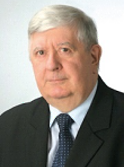Thermodynamic analysis of a thermoacoustic travelling wave engine
Abstract
Thermoacoustics has become a promising technology to use heat from low temperature sources to drive engines. This study proposes a single-stage thermoacoustic travelling-wave engine for waste-heat recovery at 150°C. All the construction details of such a system are provided. A recently developed configuration of a looped tube with an impedance matching side-branch stub is proposed. A numerical model of the engine is built in DeltaEC software to conduct the simulations. Furthermore, a detailed thermodynamic analysis of the engine is presented, including an energy balance, a description of the basic acoustic parameters in a steady state, as well as a study of a variable load influence on the performance of the engine. The Authors pointed out the necessity of the engine optimization and a proper choice of load related acoustic impedance, which would consider a trade-off between high power and high efficiency. Eventually, a possibility of achieving 40% exergy efficiency of the proposed engine is confirmed.
Downloads
Copyright (c) 2018 Adam Ruziewicz, Alexander Kruse, Zbigniew Gnutek

This work is licensed under a Creative Commons Attribution 4.0 International License.
Authors retain full copyright to their individual works.
The Journal of Mechanical and Energy Engineering (JMEE) publishes fully open access articles.
Open Access benefits:
- High visibility – all articles are made freely available online for everyone worldwide, immediately upon publication.
- Increased visibility and readership.
- Rapid publication.
- All articles are CC BY licensed. The final article can be reused and immediately deposited in any repository.
- Authors retain the copyright to their work.
By publishing with us, you retain the copyright of your work under the terms of a Creative Commons Attribution 4.0 International (CC BY) license.
The CC BY license permits unrestricted use, distribution and reproduction in any medium, provided appropriate credit is given to the original author(s) and the source, a link to the Creative Commons license is included, and it is indicated if any changes were made. This means that you can deposit the final version of your work in any digital repository immediately after publication.
We are committed to providing high-level peer review, author and production services, so you can trust in the quality and reliability of the work that we publish.





